
BY THE TIME I GRADUATED from high school in Oklahoma in 1940 at the ripe old age of 19, I could see that the United States was going to get dragged into a world war. I had grown up in a farming family during the Great Depression and had felt the terrible hardships it caused us firsthand. The effects of the economic devastation continued to linger throughout our state. Finding a good paying job, or any pay, was like trying to find fertile soil in the ravaged Dust Bowl. I tried to join the Army at Fort Sill and asked about becoming a pilot. A lieutenant with a very sharp tongue shot me down right away.
"Sonny boy," he said, "You got to get yourself two years of college first, and then maybe we will talk to you." I was depressed as the red clay soil under my feet but was determined to earn my wings. I moved to Wyoming, found work, and enrolled in the Civilian Pilot Training Program (CPTP) and earned a private pilot’s license in a 50-horsepower Piper Cub with no brakes and a tail skid. A week later, the Japanese bombed Pearl Harbor and I got the impression from the Army recruiter I visited that if a fellow could see lightning and hear thunder then they would gladly take me!
Newly minted fighter pilot
この記事は Flight Journal の November - December 2023 版に掲載されています。
7 日間の Magzter GOLD 無料トライアルを開始して、何千もの厳選されたプレミアム ストーリー、9,000 以上の雑誌や新聞にアクセスしてください。
すでに購読者です ? サインイン
この記事は Flight Journal の November - December 2023 版に掲載されています。
7 日間の Magzter GOLD 無料トライアルを開始して、何千もの厳選されたプレミアム ストーリー、9,000 以上の雑誌や新聞にアクセスしてください。
すでに購読者です? サインイン

Keeping 'em Flying!- The new generation of warbird pilots, restorers and mechanics
The new generation of warbird pilots, restorers and mechanics. Nearly 80 years after the end of World War II, the fighters, bombers, and trainers that defended freedom continue to enthrall and inspire audiences at airshows, thanks to generations of warbird pilots, maintainers, restoration specialists and collectors. In our September, 2022 issue we introduced you to the young warbird pilots, maintainers and restorers who are already beginning to displace more "experienced" warbird fliers and fixers.

The Corsair Maker- Bringing the Vought Corsair to the fleet was a daunting challenge that spanned nearly three years.
When the first production Corsairs exited the Stratford factory in June 1942, Guyton, as seen here, was tapped to manage the flight and production test program. Armament was improved to six wing-mounted .50s, displacing the wing fuel tanks now placed forward of the cockpit which necessarily was moved rearward by 32 inches. Overall length was increased, armor plate added, landing, arresting and tail gear improved, aileron control enhanced, and a new version of the R2800 engine was incorporated. But those significant improvements unearthed numerous idiosyncrasies that would take an extended period to make the Corsair acceptable for carrier operations
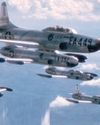
STARFIRES Over Korea
F-94 pilots tangle with MiGs
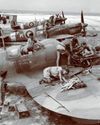
Training Mission
BY THE TIME THIS TRAINING SCENE WAS RECORDED in Canne, Italy, in July 1944, Allied Yugoslavian airmen had several years of experience working side by side with the RAF.
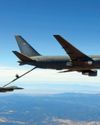
KC-46A PEGASUS
Next generation aerial refueler
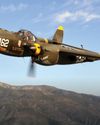
"SATAN'S ANGELS" ACE - Tales from a P-38 pilot in the South Pacific
\"AS A KID GROWING UP on the bow of my father's tugboat, hauling oil from Seattle to Alaska, I had a lot of time on my hands.
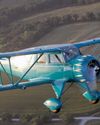
WACO YKC - Stunning and Ultra Rare Golden Age Cabin Flier
BETWEEN THE IMPLEMENTATION of the Air Commerce Act of 1926 and December 31, 1948, all U.S. registered flying machines sported an N-number, much as they do today, the \"N\" being an internationally recognized identifier for the United States. During that period, however, an additional letter-identifier followed the \"N.\" Depending on their category, they were registered in the NC (Commercial), NG (Glider), NL (Limited), NR (Restricted, usually meaning race airplanes), NS (State government), and, finally, NX (experimental).
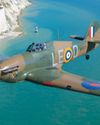
BADER'S HURRICANES
Double amputee fighter ace Douglas Bader and his Battle of Britain Hurricanes
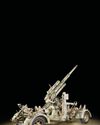
Scourge of the Allied Fighters
IT HAD TO BE THE MOST HELPLESS FEELING in the world: you're at 25,000 feet over Europe knowing that your primary function is to drop bombs-or flying escort for the bombers while being a slow-moving target for some of the world's finest shooters. However, you have John Browning's marvelous .50 caliber invention to give some degree of protection. Unfortunately, you're absolutely helpless against flak. Piloting and gunnery skills play no role in a game where sheer chance makes life and death decisions. For that reason, the Krupp 88 mm Flak 18/36/37 AA cannon could be considered WW II's ultimate stealth fighter. You never saw it coming.
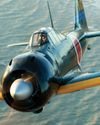
ZERO MYTH, MYSTERY, AND FACT
A test pilot compares the A6M5 Zero to U.S. fighters